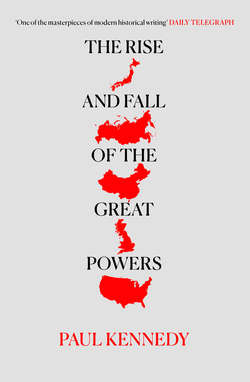Читать книгу The Rise and Fall of the Great Powers - Paul Kennedy - Страница 16
2 The Habsburg Bid for Mastery, 1519–1659
ОглавлениеBy the sixteenth century, then, the power struggles within Europe were also helping it to rise, economically and militarily, above the other regions of the globe. What was not yet decided, however, was whether any one of the rival European states could accumulate sufficient resources to surpass the rest, and then dominate them. For about a century and a half after 1500, a continent-wide combination of kingdoms, duchies, and provinces ruled by the Spanish and Austrian members of the Habsburg family threatened to become the predominant political and religious influence in Europe. The story of this prolonged struggle and of the ultimate defeat of these Habsburg ambitions by a coalition of other European states forms the core of this chapter. By 1659, when Spain finally acknowledged defeat in the Treaty of the Pyrenees, the political plurality of Europe – containing five or six major states, and various smaller ones – was an indisputable fact. Which of those leading states was going to benefit most from further shifts within the Great Power system can be left to the following chapter; what at least was clear, by the mid-seventeenth century, was that no single dynastic-military bloc was capable of becoming the master of Europe, as had appeared probable on various occasions over the previous decades.
The interlocking campaigns for European predominance which characterize this century and a half differ both in degree and kind, therefore, from the wars of the pre-1500 period. The struggles which had disturbed the peace of Europe over the previous hundred years had been localized ones; the clashes between the various Italian states, the rivalry between the English and French crowns, and the wars of the Teutonic Knights against the Lithuanians and the Poles were typical examples.1 As the sixteenth century unfolded, however, these traditional regional struggles in Europe were either subsumed into or eclipsed by what seemed to contemporaries to be a far larger contest for the mastery of the continent.
